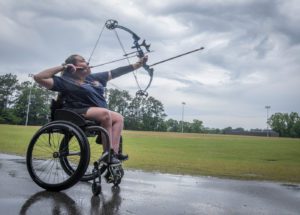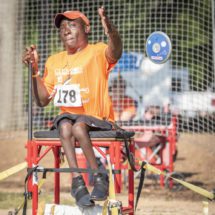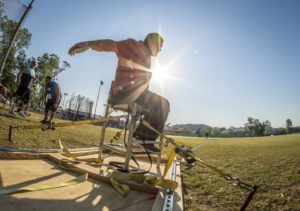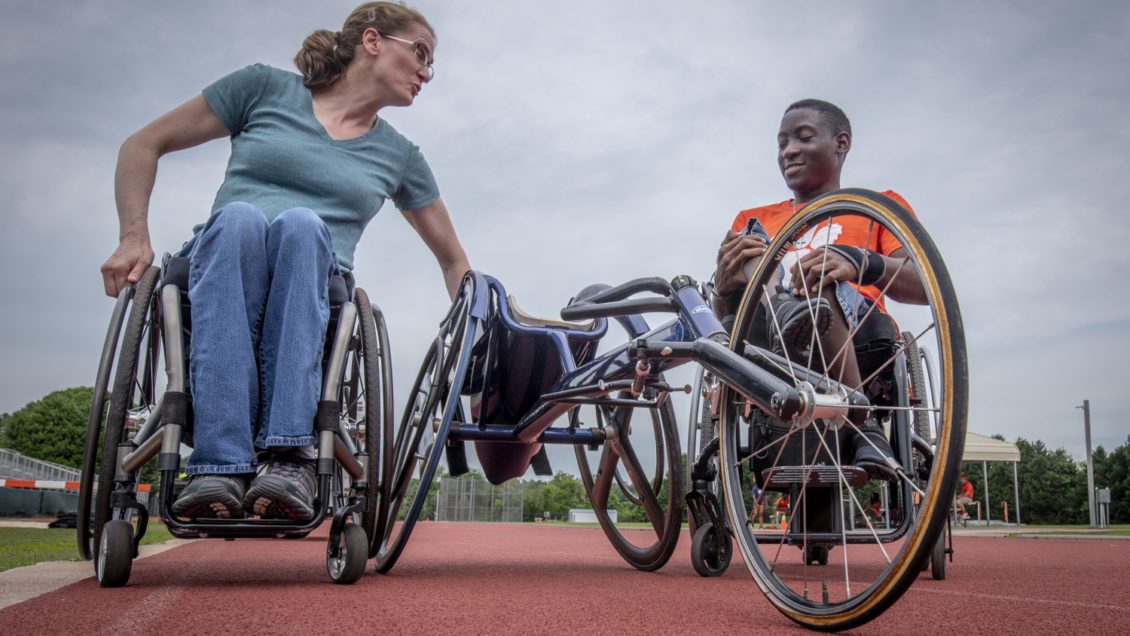Clemson University proudly welcomed athletes from across the country as it hosted the 25th annual Southeastern Regional Wheelchair Games, May 18 and 19. Aside from offering adaptive sport athletes the opportunity to compete, the event aims to stimulate awareness of wheelchair sports, promote the rights of wheelchair competitors in sports and recreation, educate individuals with disabilities through athletic competition, and focus positive attention on the abilities of athletes with disabilities.
Clemson’s support of the games is welcomed by adaptive sport athletes from all over South Carolina and beyond, said Scarlett Lawhorne, a senior studying recreational therapy who competes in archery.
“It’s great to have the games at Clemson, especially since they’re trying to up their adaptive sport program,” said Lawhorne. “I’ve been doing archery for seven years, and I’m used to doing one in Florida called the Dixie Games. Being able to do one here is really nice.”

Two-time Paralympian Scott Winkler, who attended the games both as a competitor and coach, said the SRWG is a great opportunity for disabled athletes of all ages. In 2008 Winkler, a former U.S. Army soldier, was the first injured veteran to qualify for the Paralympic Games, which were held in Beijing, China. He competed in shot put and set a new U.S. record of 11.27 meters.
“The SRWG was where I got my start in 2007 when I first came on the circuit,” he said. “These games at Clemson today could lead to someone else going as far as I did.”
More importantly, he said, the games help young athletes improve their mental and physical health.
“These events push us out there to try something new,” he said. “Sports help you mentally, physically and emotionally. You get out there, start some kind of sport and your body feels better, and you feel better about yourself. It shows that there’s life after injury.”

The SRWG has been held in Myrtle Beach for the past 24 years, but Clemson assistant professor of recreational therapy and event director Jasmine Townsend orchestrated the move to Clemson this year to better accommodate athletes.
“They’ve had decreasing numbers over the last decade because they always had it in early April, which conflicted with the National Wheelchair Basketball Association’s (NWBA) national championships,” she explained. “A lot of adaptive sport athletes are multi-sport so many of them were choosing that over track and field.”
Townsend said holding the games at Clemson will be more feasible for most of the competitors geographically as well, since it’s just two hours from major hubs Atlanta and Charlotte, providing more opportunity for athletes to compete.
This year there were 15 athletes from around South Carolina, Tennessee and Kentucky participating, but Townsend predicts a much better turnout next year.
Lawhorne agreed: “I think once we get the athletes out here and they see what we’re trying to do it will bring a lot more out next year.”
Competing is just one of the benefits of the games, said Lawhorne, who said she entered her first wheelchair games when she was in middle school.
“For me, it helped me grow as a person. It brought me out of my shell,” she explained. “The traveling is good to learn independence, and you meet new people who can relate to you. People with disabilities tend to be more antisocial, because they don’t know how people will react to them, and a lot of people don’t react really well. So being around others in wheelchairs helps.”

Lawhorne said, as she competes through her college years, she has discovered another, unexpected benefit.
“It’s great for networking!” she laughed. “I didn’t understand that until I got older, but as I’m looking for internships and jobs all of these people I’ve met – the coaches, the mangers and the athletes – will be amazing for me when I graduate.”
Three national records were set at the event including one by Winkler who threw a shot put to a record 9.86 meters in the seated throws F55 (athletes have full arm muscle power and some trunk power, which allows for upward movement off the chair, more forward and backward movement, and rotation) Master 35 division. Michael Wishnia, a former Marine sergeant from Livingston, N.J., threw for a record 14.3 meters in the F57 (athletes meet the minimum criteria for deficiency, loss of range of motion or muscle power movement in the lower limbs) Master 35 shot put division, and discus-thrower William Johnston from Hope Mills, N.C. landed a record 19.45 meter throw in the F57 Master 50 division. The records were certified by representatives of Adaptive Track & Field USA – the National Governing Body (NGB) for wheelchair track and field and road racing in the USA.
The games are open to disabled athletes of all ages, and organizers encourage any disabled person in the area to give them a try whether they see themselves as athletes or not.
“You have to start somewhere,” said Winkler. “I live by a motto: ‘If you believe you can achieve.’ That’s what it’s all about. It’s not the disability, it’s the ability – and I’m living proof.”
Get in touch and we will connect you with the author or another expert.
Or email us at news@clemson.edu

